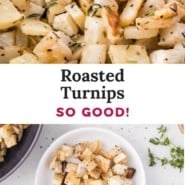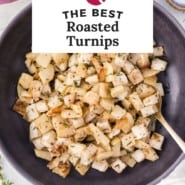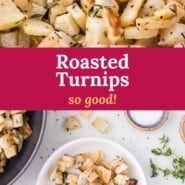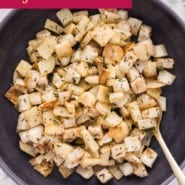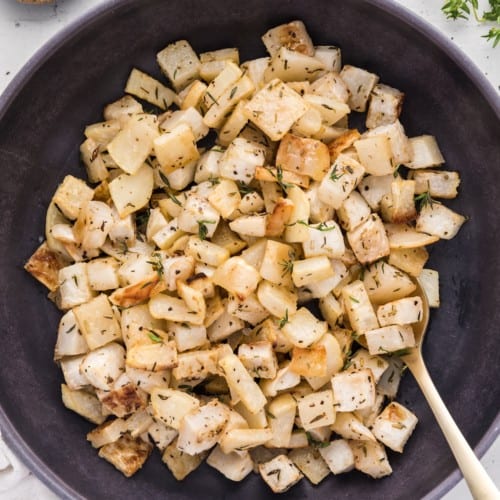When you roast the humble turnip, magic happens! Roasted turnips are tender and mellow, with beautifully caramelized edges and a bit of a peppery kick. This low-carb veggie deserves a spot in your regular side dish rotation!
Recipe Overview
Why you’ll love it: Turnips you’ll actually want to eat! Roasting mellows their sharp flavor and makes them melt-in-your-mouth tender.
How long it takes: 5 to 10 minutes to prep; 30 minutes to roast
Equipment you’ll need: A sharp knife, mixing bowl, sheet pan
Servings: 4
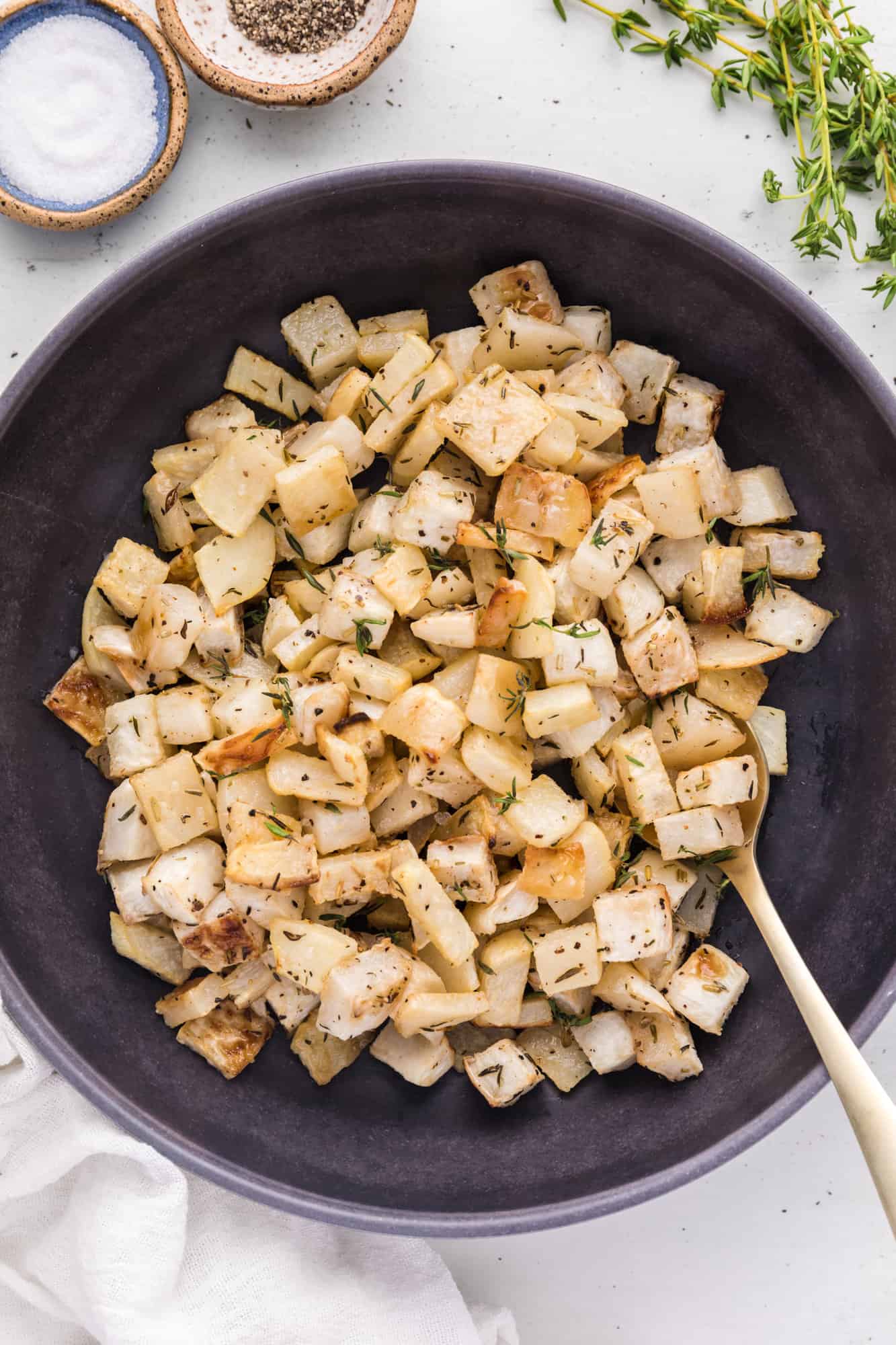
Let’s get excited about turnips… said no one ever. Even my mom who will generally eat anything was not excited about roasting turnips. However, she loves this warm kale salad with roasted root vegetables which includes carrots, parsnips, beets, and yes, turnips, too, so that may have won her over a little bit.
Turnips don’t exactly have the good press that heirloom tomatoes and fresh corn-on-the-cob gets, but if cauliflower can get a glow-up (hello cauliflower nachos!), then it’s time to give turnips a second chance too.
Aside from carrots, root vegetables as a whole tend to be under-appreciated, and it’s easy to see why turnips get a bad rap. Their natural flavor is sharp and even spicy and they aren’t all that attractive-looking either.
When you roast turnips, though, that all changes. The flavor becomes nutty and even a little bit sweet, and while there’s a still a bit of bite, it’s a pleasant tingle. If you’ve roasted radishes, you know what I’m talking about. Like I said: magic!
This is the kind of back pocket side dish recipe you’ll find yourself making over and over. Add roasted turnips to salads, pair them with your favorite proteins, use them in meal bowls, and more!
(Ready to give some other root veggies a try? Check out my parsnip puree, air fryer beets, and roasted carrots with thyme and nutmeg.)
About this Roasted Turnips Recipe
- Turnips are a nutritious, low-carb alternative to potatoes. If you’re watching your carb intake, roasted turnips make an excellent substitute for roasted potatoes. According to Healthline, turnips have numerous health benefits. They are high in vitamin C, antioxidants, minerals, and glucosinolates.
- Roasting may be the best way to cook turnips! There are many ways to cook turnips but I love turnip recipes that roast the veggie in the oven because it really transforms them. Turnips are a cruciferous vegetable, in the same family as broccoli, cauliflower, and Brussels sprouts, and roasting tames all of these vegetables, giving them a slightly nutty flavor.
- Roasted turnips are an easy weeknight side dish. Toss the turnips with oil and seasonings and then pop them in the oven—it’s as simple as that! Roasted turnips are a great low-effort side for nights when you’ve got a more labor-intensive main dish. (Or when you just don’t want to put that much work into dinner. We all have those nights too!)
How To Choose Turnips
Turnips are bulb vegetables with a waxy light purple or pink exterior, and white flesh on the inside.
Look for turnips that feel heavy for their size, with firm, unblemished flesh. Smaller turnips are better than larger ones, which can be tough and woody.
Store turnips in the crisper drawer of your refrigerator. They’ll keep for a few months.
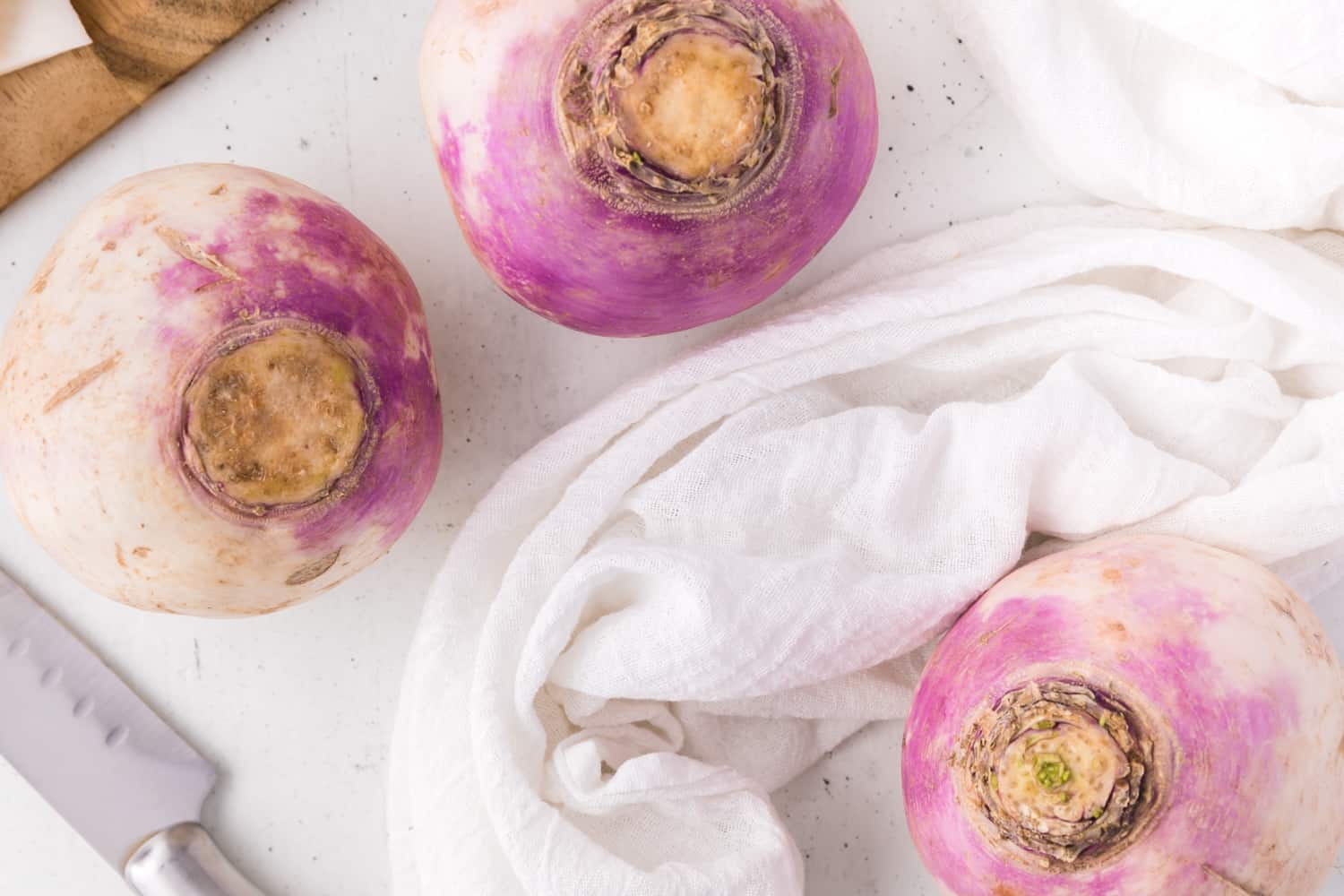
Ingredients you’ll need
- Turnips: If your turnips happen to come with greens attached, don’t throw them out! Turnip greens are tasty and nutritious. Use them to make my creamy lemon orzo with greens or throw them into a pot of vegetable soup.
- Olive Oil: No need for a fancy EVOO here since you’re using this for cooking.
- Kosher Salt and Coarse Ground Black Pepper: A dynamic duo that enhances the flavor of any vegetable.
- Dried Thyme and Rosemary: The flavor of these two herbs works well with earthy root vegetables. If you happen to have fresh herbs on hand, you can substitute sprigs of thyme and rosemary in this roasted turnips recipe.
- Garlic Powder: Garlic powder doesn’t have the bite of fresh and it won’t burn in the oven either.
- Fresh Parsley or Thyme: Optional garnishes.
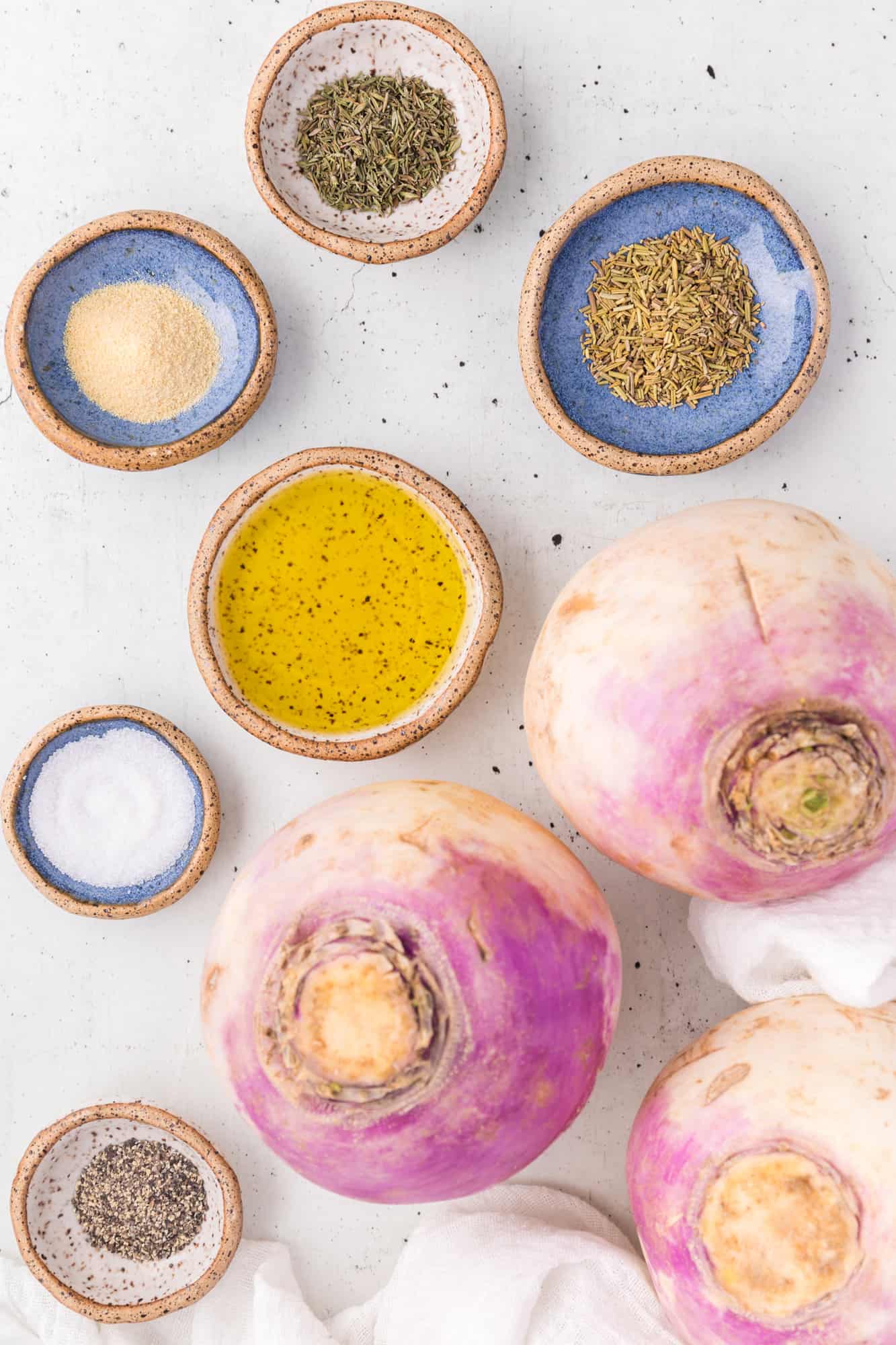
How to make Roasted Turnips
Preheat your oven to 425°F. You’ll need a large rimmed sheet pan, 14 x 10 inches. For easy cleanup, you can line the pan with parchment paper but the turnips will brown better without it.
Peel the turnips (a vegetable peeler works great!) and cut them into bite-sized pieces. They should be roughly the same size.
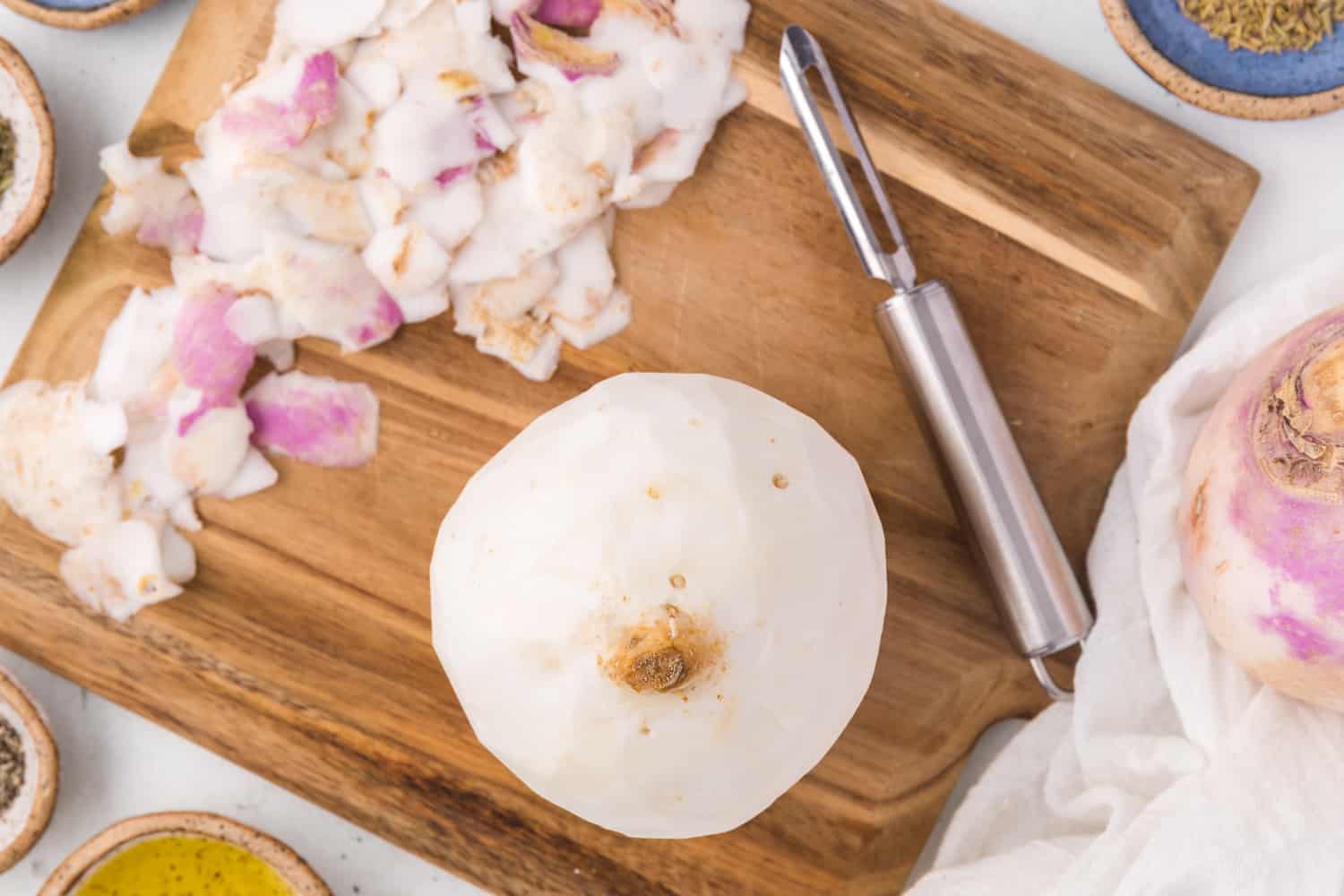
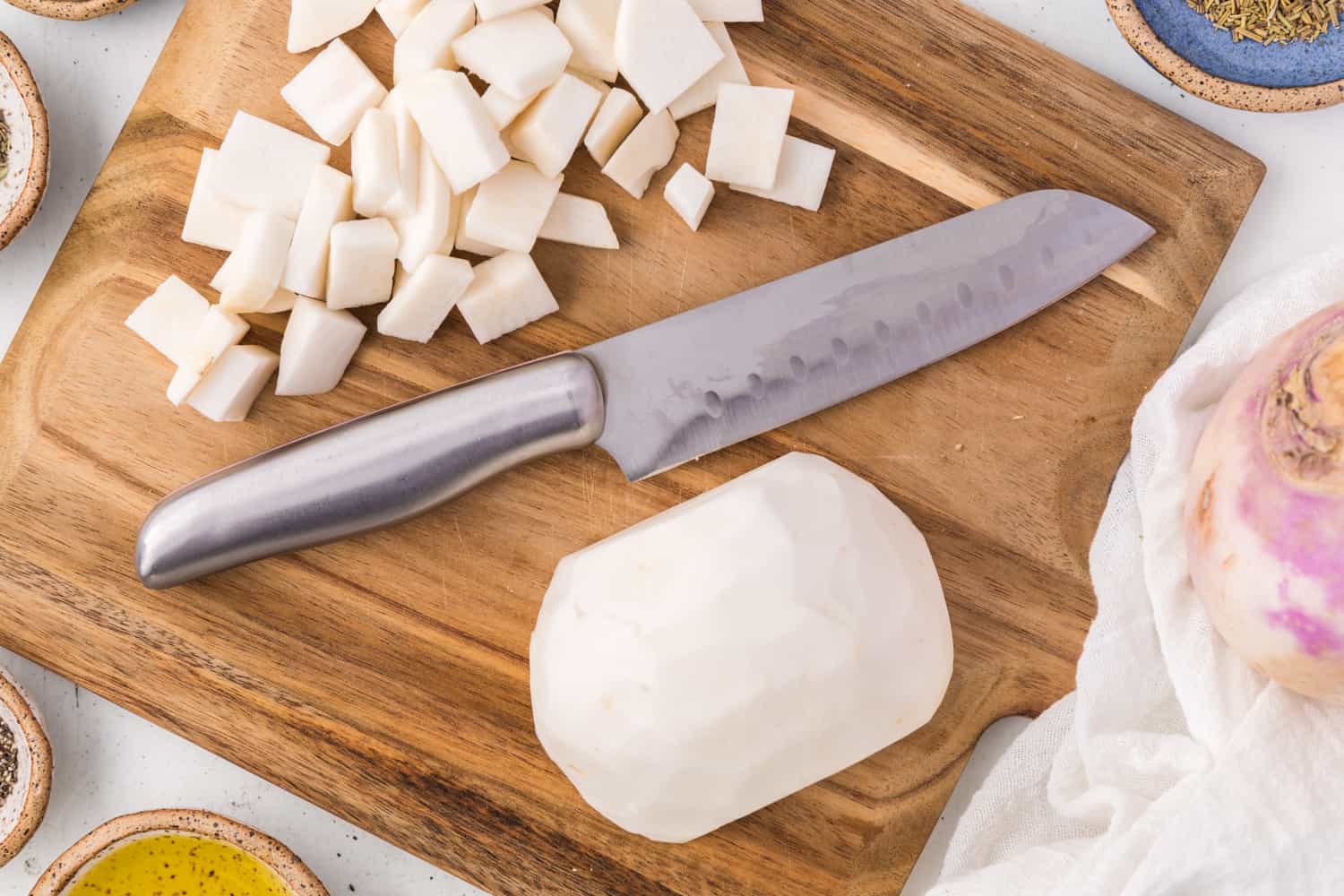
Add the turnips to a mixing bowl, along with olive oil, salt, pepper, dried thyme, rosemary, and garlic powder. Toss to coat.
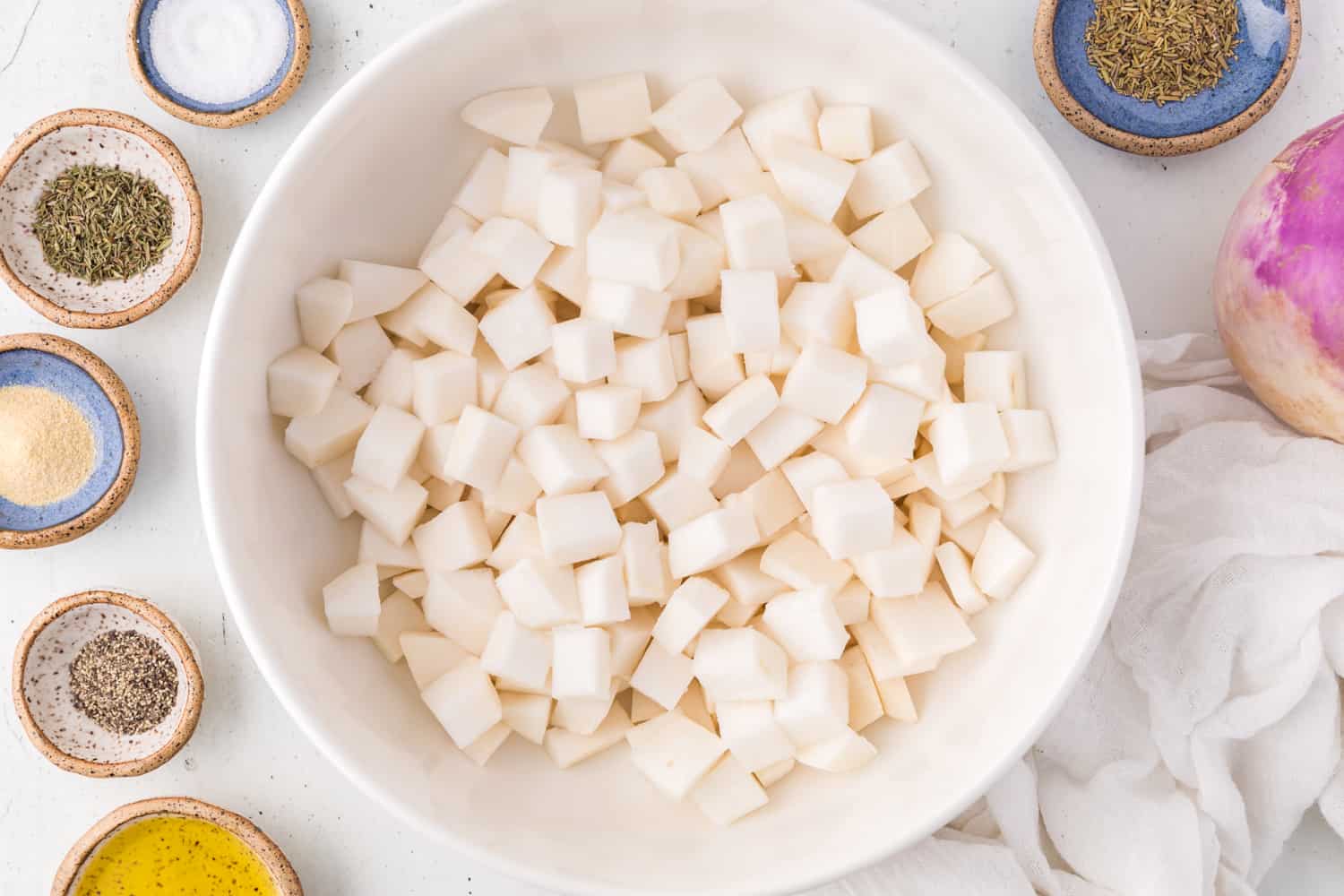

Transfer the turnips to a sheet pan and spread them out in a single layer.
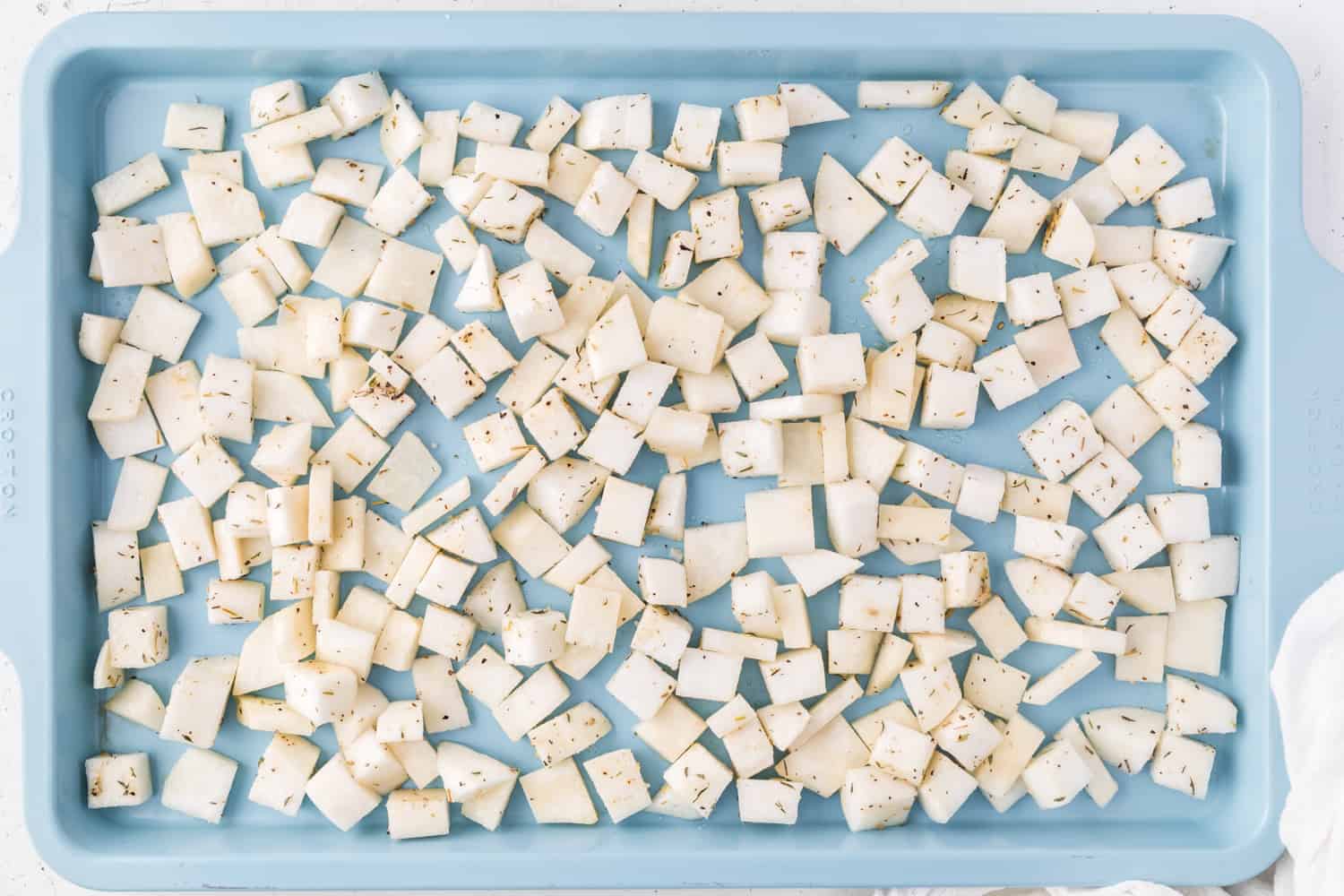
Bake for 15 minutes, then remove the pan from the oven and stir the turnips. Roast for another 15 minutes, or until the turnips are tender and golden brown.
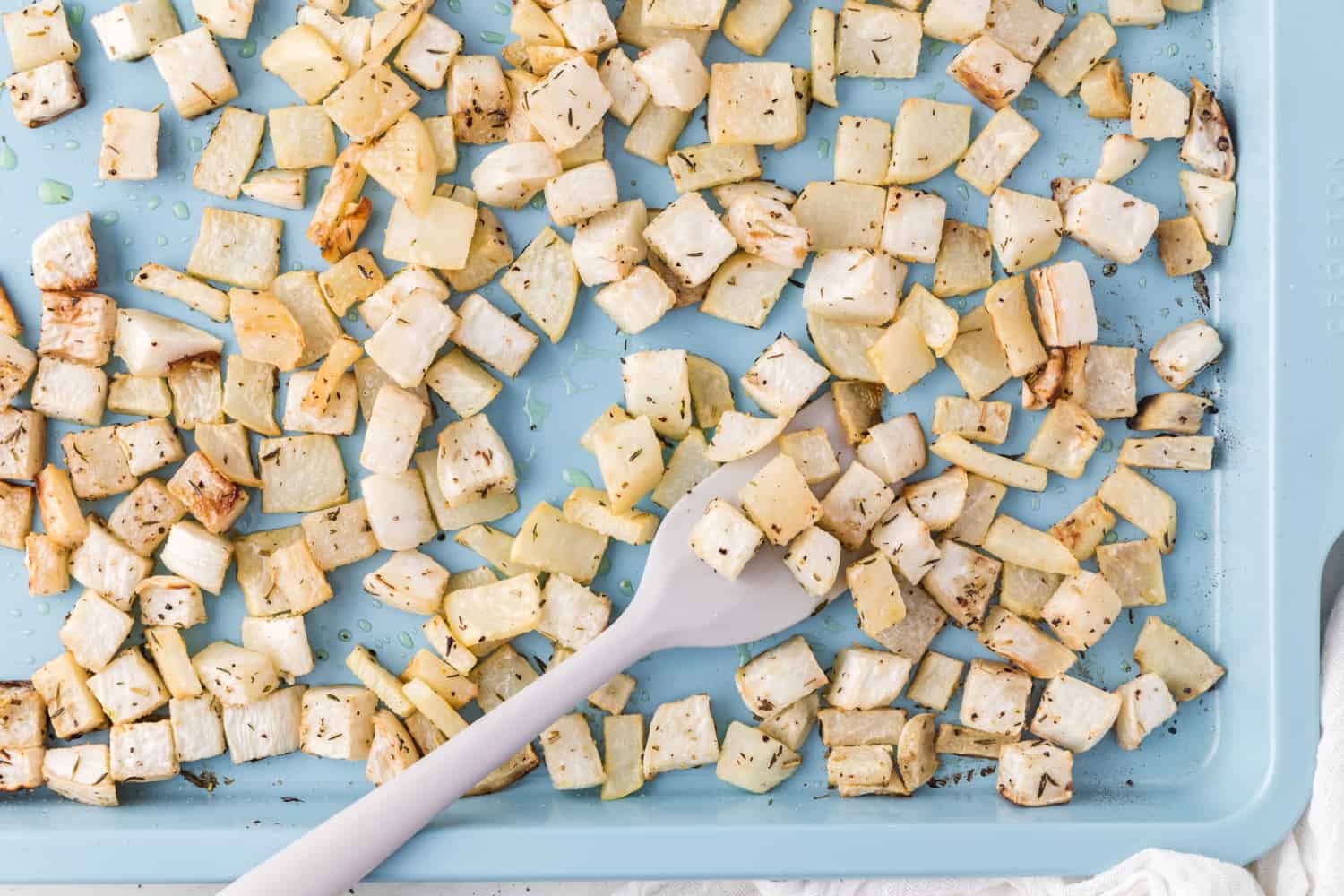
Garnish roasted turnips with fresh parsley or thyme, if desired, and serve immediately.

Tips For Roasting Success
- Preheat the oven. A hot oven is essential for good results. Don’t put the turnips into a cold oven. They won’t cook evenly and probably will burn on the bottom.
- Cut the turnips into evenly sized pieces. Large pieces take longer to cook than small pieces. Try to cut them as evenly as possible so you don’t end up with some turnips that are raw in the middle and some that are burnt to a crisp.
- Don’t crowd the pan. Good air circulation promotes browning and crisping. If there are too many vegetables in the pan, they tend to steam instead of roast. The end result will be softer and mushier.
FAQs
Turnips can be eaten raw or cooked, but they have a very sharp flavor when raw. For this reason, most people prefer cooked turnips; however, cooked turnips do have a higher glycemic index than raw turnips.
If the turnip skins feel thin, you can leave them on; if they’re thick and tough, it’s best to peel them first.
Both are in the same family of vegetables, but rutabagas are a hybrid of the turnip and cabbage. Rutabagas can be used interchangeably with turnips; they have a milder, sweeter flavor. They are more yellowish in color and are larger in size than turnips.
What to Serve With Roasted Turnips
Main dishes like air fryer pork chops, roasted bone-in chicken breasts, and spice rubbed pork tenderloin are an excellent pairing with roasted turnips. Roasted turnips are a versatile side that can round out any dinner.
You can also add them to my warm kale salad, roasted cauliflower salad with arugula and sweet potato, or southwestern farro salad with roasted poblanos. Add turnips to any salad that includes other roasted vegetables for added nutrition and flavor.
Ways To Change Up Roasted Turnips
- Make them sweeter: You’ll get a subtle sweetness from roasting turnips, but if you want to lean into that, roast turnips and carrots with honey. Simply whisk the honey with the olive oil and replace half of the turnips with carrots. Line your baking sheet with parchment paper to avoid a sticky mess!
- Make turnip fries or wedges. Cut the turnips into strips or wedges instead of cubes. Roast as directed.
- Use your air fryer: Place the turnips in an air fryer basket and cook them at 380ºF for 15 to 18 minutes, tossing them at least once during the cooking time.
- Try different seasonings: Sage pairs well with turnips, or add quartered shallots to the mix. A drizzle of melted butter or brown butter is a nice finishing touch, or swap paprika for the herbs. A squeeze of lemon juice is also good with roasted turnips!
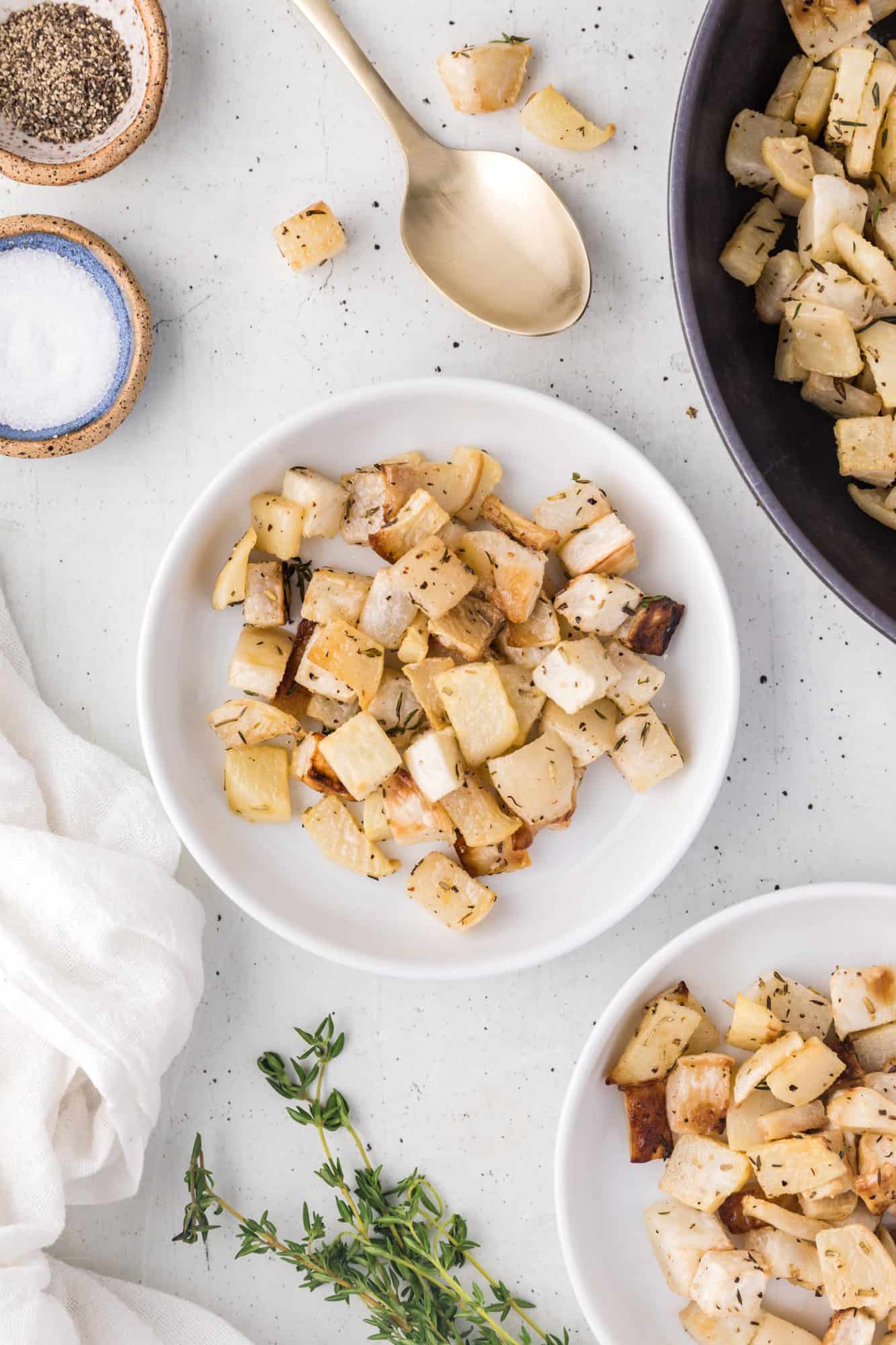
Make Ahead Ideas
Cut the turnips and coat them with the oil/seasoning mixture a day ahead of time. Store them in the refrigerator in a covered container until you’re ready to roast them.
Storage & Reheating Tips
Refrigerate: Store leftover roasted turnips in an airtight container in the refrigerator for 4 to 5 days.
Freeze: Roasted turnips freeze well. After cooking them, cool the turnips to room temperature. Place in a freezer-safe container or bag and freeze for up to 3 months. You won’t need to thaw them before reheating.
Reheat: Leftover turnips can be eaten cold on a salad or you can reheat them in your air fryer, a 350ºF oven, or the microwave.
Leftover Love
Add leftover roasted turnips to salads and meal bowls, either hot or cold.
Did you make this? Be sure to leave a review below and tag me @rachelcooksblog on Facebook, Instagram, or Pinterest!
servings
Prevent your screen from going dark
When you roast the humble turnip, magic happens! Roasted turnips are tender and mellow, with beautifully caramelized edges and a bit of a peppery kick. This low-carb veggie deserves a spot in your regular side dish rotation!
Instructions
-
Preheat oven to 425°F.
-
Peel the turnips and cut them into bite-sized pieces (about ½ -inch cubes). Try to keep the pieces relatively uniform in size to ensure even cooking. If desired, cut the turnips into strips or wedges to make turnip fries.
-
In a mixing bowl, combine the turnips, olive oil, salt, pepper, dried thyme, rosemary, and garlic powder. Toss well to evenly coat the turnips with the seasoning mixture.
-
Arrange seasoned turnip cubes on rimmed sheet pan 14 x 10 inches), spreading them out in a single layer.
-
Bake for 15 minutes, remove the pan from the oven, and stir the turnips. Return the pan to oven for an additional 15 minutes, or until turnips are tender and golden brown.
-
Serve immediately, with optional garnish of fresh parsley or thyme.
Notes
- Flavor variations: Replace thyme with sage; add quartered shallots to the mix; or swap paprika for the herbs. Top with a drizzle of melted butter, brown butter or a squeeze of lemon juice.
- Air fryer roasted turnips: Prepare turnips as instructed above (steps 1 through 3). Arrange turnips in air fryer basket and air fry at 380°F for 15 to 18 minutes, tossing one or two times so they brown evenly.
- Storage: Raw turnips can be stored in the crisper drawer of your refrigerator for a few months. Roasted turnips can be refrigerated for up to 5 days or frozen for up to 3 months.
Nutrition Information
Calories: 64kcal, Carbohydrates: 8g, Protein: 1g, Fat: 4g, Saturated Fat: 1g, Polyunsaturated Fat: 0.4g, Monounsaturated Fat: 3g, Sodium: 367mg, Potassium: 221mg, Fiber: 2g, Sugar: 4g, Vitamin A: 3IU, Vitamin C: 24mg, Calcium: 36mg, Iron: 0.5mg
This website provides approximate nutrition information for convenience and as a courtesy only. Nutrition data is gathered primarily from the USDA Food Composition Database, whenever available, or otherwise other online calculators.
